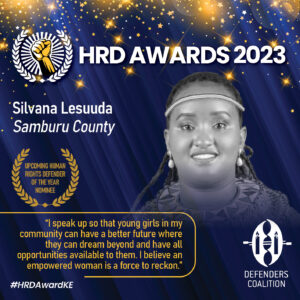
Silvana Lesuuda is a social justice activist leading Network Empowering Samburu Transformation ( NEST), a women-led organization based in Samburu County, located in Kenya’s ASAL areas and is home to pastoralists and indigenous persons characterised with largely patriarchal social and political setups.
Human Rights Issues Engaged in
In Lesuuda’s community, women’s voices continue to be suppressed, ignored, and marginalised, despite their contribution to the community.
Over the years, Lesuuda has been creating awareness and the recognition of the true role of women and girls in the community. She has been able to raise women’s voices in a community where women face a unique seat of marginalization. Lesuuda, through NEST advocates for the end of period poverty and stigma, early child marriage and fighting against harmful practices such as Female Genital Mutilation (FGM).
Scope, reach, and impact of the work
Despite working against entrenched cultural power dynamics, Lessuda has managed to score positive outcomes with a crucial constituency, the morans, against Child marriage and period poverty. She has turned some of the morans into a champion of her cause. Before her engagement, such conversations were considered taboo.
“I have succeeded in sustaining the conversation and setting the agenda against Children’s Marriages; I have led conversations on period poverty, which I now work closely with Moran men as my champions and advocates; these talks were initially considered taboo but have been accepted at the moment.”
Degree of difficulty
Lesuuda is fighting against a deeply entrenched cultural norms where power is disproportionately wielded by men, mostly old men. As a woman, that is an incredibly difficult undertaking.
Why the HRD stands out from others working on similar issues
Convincing the Morans- the centre of gravity of the community in upholding the patriarchy, and working with them as ambassadors, makes Lesuuda a worthy awardee